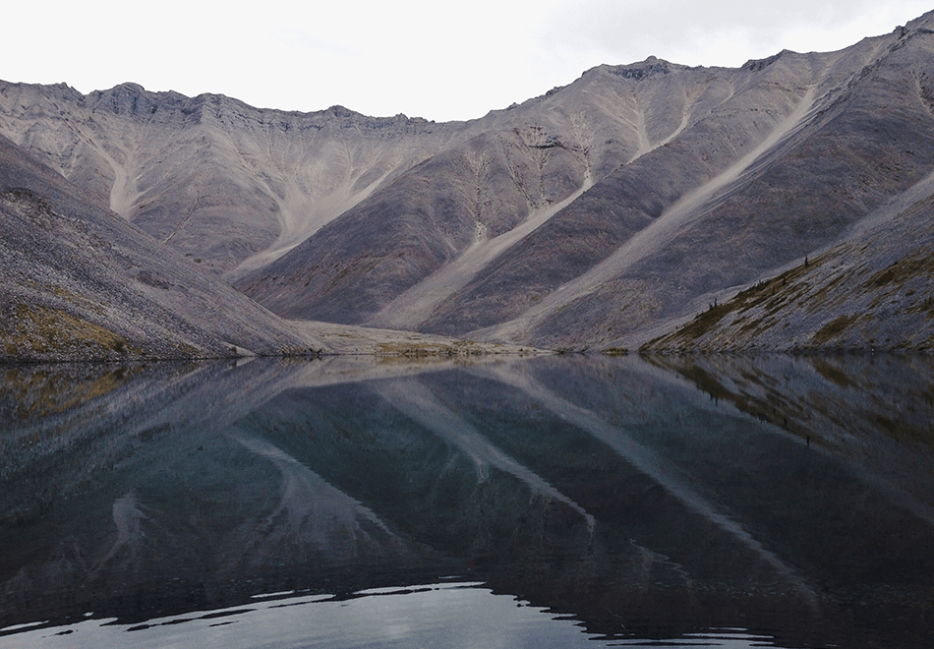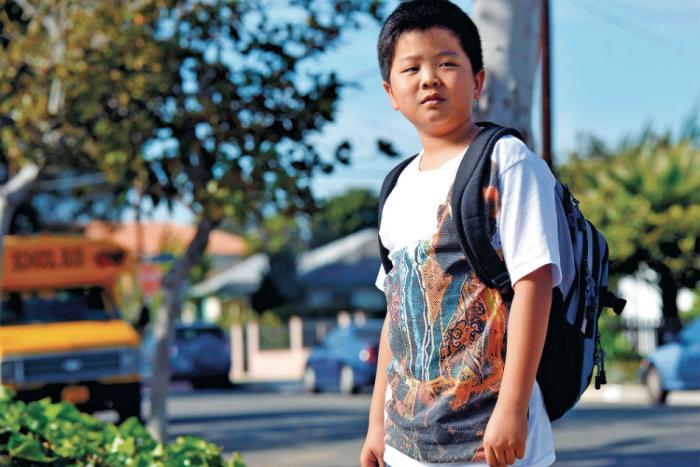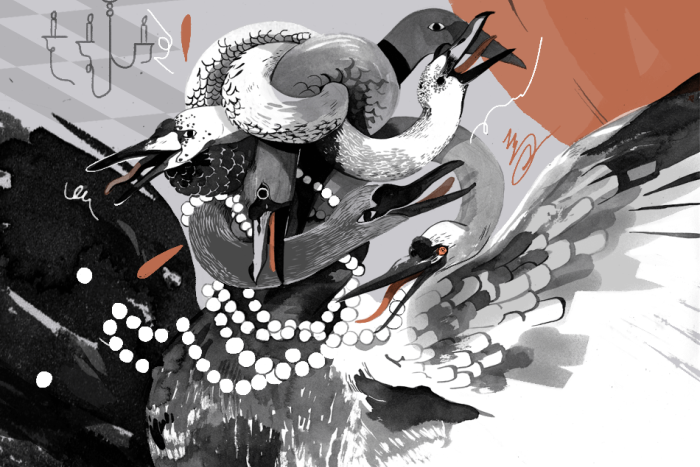What was important to us in 2016? Hazlitt’s writers reflect on the year’s issues, big and small.
Some colour lingered in the western sky as a big, day-past-full moon made its debut in the east. And then the Northern Lights came out to play. I’m always raving to my friends about Yukon skies—how I love them because something cool is always going on up there, day or night. And this one was a booming, “I told you so” to the five guys paddling the Wind River with me. We kept the fire going until 2 am under that sky, talking, laughing and drinking Centurions (that’s what we call vodka and grape mix or lemonade because we figure they’re a poor man’s Bloody Caesar). Whatever adventures we have on the water, the time around the fire is always my favourite part of any canoe trip.
Four years ago, my friend Steve and I had paddled the Snake, another Peel Watershed river, and the Wind was supposed to be much easier. Some people called it the Peel’s “family river.” But a week before our trip, the Wind had been in flood. When the de Havilland Otter dropped us off at McClusky Lake, the pilot picked up a canoe left behind by a group that had been choppered out a few days earlier. And the water was still high.
At the other end of a 300-metre portage from the lake, we put in at a creek. I know people who have done this trip when the water was so low that they’d spent a lot of time dragging their canoes here. We paddled a torrent, navigating tight turns and fallen trees called sweepers.
Once we were on the Wind, the river continuously split into several channels, called braids, which then converged again. On braided rivers, you first have to pick the best channels so you don’t hit trouble or run aground. Then you have to navigate the convergences, which can be especially tricky when the water is high and fast. And because of the water level, the river braided much more than we expected. Family river, my arse, we agreed.
After years of paddling lakes and humping canoes and packs on portages, I’d started doing whitewater rivers with some friends a decade or so ago. I was reluctant at first, but soon discovered I loved shooting rapids. Usually, I was in the bow and I trusted the guy in the stern. For this trip, though, I took the stern.
And I was struggling. Rick, who’d been a quarterback in high school, weighs 45 pounds more than I do and I had trouble making the canoe go where I wanted to go. As we turned a corner, I saw that Steve had jumped out of his canoe to warn us about something. “Keep your paddle in the water,” he yelled. We hit the convergence, wobbled and, in what seemed like slow motion, I saw Rick tumble out of the bow. I knew no matter what I did, I would be next.
On southern rivers, my attitude is that dumping in whitewater is like falling on a ski hill: if you never dump or fall, you’re not trying hard enough. But in the North, the water is dangerously cold and any kind of help is far away (during eleven days on Wind we saw one other group once). I made my way to the right bank as the current took me downstream. Steve held out the handle of his paddle for me to grab and then helped me out of the water. Rick made it to the left bank and somehow managed to take the canoe with him. We were fine. I did lose my ball cap, but over the years, I’d learned to pack an extra one.
*
The Wind River took us through gorgeous multi-coloured mountains. The aquamarine water was gin clear at the beginning, but it grew more turbid as we made our way down toward the Peel. At more than one campsite, we had trouble deciding where to sit around the fire because of the spectacular views in every direction. And at our first site, before we grilled steaks over the fire, the Yukon treated us to a 180-degree double rainbow.
The six of us went to high school together so we’ve known each other for more than four decades. While most of the canoe trips I do are within a drive of my home in Toronto, the ones I do with these guys are longer and more remote and more expensive. They are once-in-a-lifetime trips, though we keep doing them. Our first one was on the Nation Lakes in northern B.C. when we turned 40. We did another at 50 and one night, as we gathered around a fire on the Yukon’s Big Salmon River, we agreed we wouldn’t wait until we were 60 for the next one because we might not all make it that far. When we did a trip in the Northwest Territory at 55, two guys couldn’t make it and the four survivors thought we’d lost them. But all six of us were back together again as we celebrated 58.
Well, celebration isn’t quite the right word. Excuse might be more accurate. The older we get, the more we realize we may not have many more opportunities to do some of the things we love to do. But we also want to prove to ourselves that we can still do these things, that we’re not really getting old.
*
Some of us were closer than others in high school. And we all fell into various careers—zoology, money, ship navigation policy, law, cartooning and writing—and scattered to different cities. We all have our own egos and eccentricities and annoying faults, but we like each other anyway. And when we get together, we are 14 again. (Back in Whitehorse after our trip, three of us returned to the hotel at 3 am and Rob invited us into his room to hear Grahame snoring. I recorded the inhuman sound and sent the file to the rest of the group. When Rob’s wife opened the email of their shared account and heard the clip—which features our hysterical giggling in the background—she responded with: “How old are you?”)
A good question. We may not act it—and we certainly don’t like to admit it—but we are getting old. The first book I read in 2016 was Sixty, Ian Brown’s smart and funny account of aging. I wasn’t particularly interested in the subject, but Brown is a friend and one of the best writers in the country. The book is a diary of the year between when he turned 60 and when he turned 61 and he devotes much of it to fretting about his body (which he claims is falling apart despite his impressively active lifestyle); his hairline; his brain (which science tells him has been on the decline for decades); his memory: his finances (which are insufficient for a long and happy retirement); his aversion to risk; his accomplishments (which, all evidence to the contrary, he feels are inadequate) and just about everything else. Brown reveals all his regrets and fears, and as much as I enjoyed reading the book, I couldn’t help but wonder, “Should I be worrying about this stuff?” I mean, I still had a little time before turning 60, but I’m just not that concerned about most of the things he’s worried about (my hairline and, when I can ignore the subject no longer, my lack of money being two exceptions).
Not that I’m happy about getting old. Aging isn’t quite as horrific as I’d feared, but it’s definitely not as fun as staying young would be. The truth is I prefer to approach the whole matter with a healthy amount of denial. But I find it impossible to be oblivious. For one thing, my father died at 59. For another, the reminders can seem constant. Aside from our much griped-about aches and pains and long recovery times, all of us on the trip take a pill for something or other each morning. And on our Northwest Territories trip, the form we had to fill out before flying in the bush plane asked the colour of our hair. Rob and I looked at each other and put down gray. Salt and pepper seemed too precious under the circumstances and, anyway, it was less and less true every day.
I come from a generation that declared, “No More Heroes.” But that was just naïve idealism. Of course we had heroes and so many of them died this year. Bowie and Prince and The Greatest and Mr. Hockey and Leonard were all members of my personal pantheon. Ali and Howe and Cohen weren’t surprises because they were old and unwell, but Prince was born just three weeks before I was. So feeling a little mortal is unavoidable.
But there’s something else, too. At the end of David Remnick’s profile of him, Cohen says, “More than any time of my life, I no longer have that voice that says, ‘You’re fucking up.’ That’s a tremendous blessing, really.” I’m not sure how much that line would have resonated with me when I was younger, but I totally get it now. My “you’re fucking up” voice occasionally still speaks up, but not nearly as often. I have, to an extent that surprises me, found out who I am and—this is what truly stuns me—become comfortable with him.
*
On the third day, we switched up the canoes. Grahame, who is much lighter than I am, took my bow and Rick moved to Rob’s. At times during the next several days, I felt like we were going from crisis to crisis as we navigated the braids and boils and wave trains, an experience that was even more exhausting mentally than physically. Most of the time, Grahame and I didn’t talk much except to discuss what lines to take through the water and occasionally remark on the remarkable scenery. But we stayed upright and became increasingly comfortable and finally made it the convergence of the Wind and the Peel. The most challenging paddling was over, except for the canyon.
We spent a long time scouting the rapids from the long gravel bar on river right before the canyon. We discussed where to enter the wave train and what line to take once we had. We didn’t want to be too far right or we’d miss the turn into the canyon altogether, but too far left looked ugly. And our big worry was that as the river turned left, the water would slam us against a high rock face on the right. That would be bad.
We each took a nervous piss and then Steve—who we dubbed the director of steerage at the end of the trip—and Scott went first. From where we were standing, we could see them make it past the rock wall but then suddenly their canoe spun around and they were facing the wrong way. They’d hit a whirlpool. They looked to be in trouble, but the whirlpool spat them out in the right direction as they disappeared around the corner.
Grahame and I took our time getting into our canoe. We entered the wave train at a good spot and stayed centre right. As we started to make the turn to the left, time and our canoe slowed down. Around the corner, unable to see us, Steve said, “They didn’t make it. They didn’t make it.” He expected to see two swimmers and an overturned canoe any second. But we made it past the wall with ease and though the funnel that opened up on the right edge of our bow scared the shit of me, it didn’t spin us around and we soon joined Steve and Scott around the corner and waited for Rob and Rick. We held our breaths as they disappeared from view for what seemed a dangerous amount of time. We couldn’t see them as a whirlpool grabbed their canoe and spun them around.
But they also survived and we all paddled on to Taco Bar, where we’d wait for the plane to pick us up the next morning. Four years earlier, on our Snake River trip, Steve and I had a different kind of adventure there. Bad weather meant the plane couldn’t pick us up in the morning as planned so we spent the day under a tarp in a deluge with no food or vodka left and only a pitiful smudge fire for warmth and entertainment. Eventually, we re-assembled our tents and went to bed at 9 pm. At 2 am, I heard Steve say, “Get up. There’s water in the tent.” He wasn’t talking about the rain. The river had reached the foot of our tent. And it was rising rapidly. We roused the guys in the other tent and the four of us threw everything—tents, canoes and gear—up a small embankment as fast as we could.
On the Wind River trip, we set up camp on high ground. Just in case. And that night, it did start to rain. We sat under the tarp near the fire and sang songs as Scott played guitar. And, of course, we talked about the trip: the beauty of the land and the skies, the fun we had and the small acts of what seemed to us heroism. We’d survived a tougher-than-expected river by working together. And we were all still friends, maybe closer than ever.
That sense of accomplishment and the relief of staying alive were mixed with regret that another great trip was over. I didn’t feel old sitting around that fire in the light rain with my friends; in fact, I felt pretty damn good. And young. That’s why I find it hard to imagine the day the first one of us dies. Sure will feel weird.






